Dwight Longenecker's Blog, page 341
September 22, 2011
Defending Marriage
Catholics are often accused of being 'homophobic'--the new curse word that means we are afraid of homosexuals. I don't think I'm afraid of homosexuals, although when someone comes on my combox and says that they want to stand on my head and not take their foot off until they have 'squeezed some sense into it' I have to admit that I get a little bit afraid. When I see what homosexuals have done to the good name of Senator Rick Santorum that makes me a little bit afraid.
But I'm not really afraid of homosexuals. I am, however, disapproving of homosexuality. This is not simply because I find sodomy repulsive. I disapprove of homosexuality because I approve of marriage. So instead of blasting homosexuals and homosexuality I wish to defend, support, explain and uphold the truth and beauty of sacramental marriage.
In order to do this, one needs to understand the fully Catholic teaching on marriage. Marriage, for Catholics, is a sacrament. It is a visible means of grace. In other words, through the physical actions and commitment of marriage God's saving grace is active in our lives. Marriage is, if you like, a ladder to heaven. It is one of the ways we participate in our salvation. St John teaches us that "those who live in love live in God and God lives in them." The human covenant of marriage is the most sublime and complete way for most people to experience the love of God. In fact, it is the most urgent and active and obvious way for most people to experience and participate in the grace-filled action of God's salvation.
This sacrament--this means of grace--is something permanent and precious and life giving. It is a path to that self sacrifice that leads to eternal life. Within marriage God's life and love exists in and through and with our human love sealed and made permanent through marriage. Like all the sacraments, it is, by its very nature, life giving and healing and forgiving. Through the sacraments our broken humanity is ransomed, healed, restored and forgiven. This is especially true of marriage with it's drama of joys and sorrows spread over a lifetime. It is also especially true of marriage since only through marriage do a man and woman participate with God in the creation of new human souls.
Because marriage is such a beautiful, eternal, precious and fragile sacrament we love and cherish it. We also oppose everything that would break this precious, fragile and life giving sacrament. Divorce breaks marriage. Adultery breaks marriage. Pornography breaks marriage. Co habitation breaks marriage. Promiscuity breaks marriage. Contraception breaks marriage. Abortion breaks marriage. Child abuse breaks marriage. Homosexuality also breaks marriage.
The proponents of homosexuality will argue that it is all about 'love'. However, their definition of love is "the freedom to have sexual relations with whomever I experience erotic and romantic emotions toward." They may add to this an idea of "commitment" or even "lifelong commitment" but a moment's reflection will show that these subjective and sentimental notions of 'love' can just as easily be claimed by the adulterer, the child abuser, the co habiter and the divorcee. The adulterer will claim that he did not love his spouse any more and loves his mistress more. The co-habiter will claim to be in love with the person he or she is living with. Indeed, the child abuser will claim to love the child and may even claim to 'be in a loving relationship' with the teen they are abusing. The promiscuous man about town may claim to 'love' each woman with whom he has a one night stand. The couple who are using artificial contraception will claim that they are doing so because they love one another and 'can't afford' a child. Abortion has even been rationalized through 'love' by claiming that the person choosing abortion is doing so 'because they love the children they already have.'
Therefore, some other criteria for 'love' must be established, and a Christian society has recognized that bona fide relationship to be the thing we call marriage. In marriage love is objectified and strengthened and clarified by a life long sacrament.
Does this mean that we must hate homosexuals? Some homosexuals may be aggressive and ugly in their campaigning. Some may be disgusting in their promiscuous and degrading lifestyle. They're pretty easy to dislike, but there are heterosexuals who are disgusting in their promiscuity and degrading lifestyle. If we find some homosexual practices repulsive we also find some heterosexual practices repulsive. So that's a red herring.
On the other hand a homosexual person may be gentle, loving, restrained and disciplined and loyal to one partner. This homosexual seems more acceptable and less repulsive. He or she seems like 'such a nice guy' or 'a wonderful gal'. But a person's niceness is not the criteria for moral judgement. Plenty of adulterers, divorcees, child abusers or mass murderers were charming and polite and 'nice'. This again is a subjective, sentimental judgement and therefore a red herring.
Instead we return to the objectivity of natural law and conclude that the sexual organs are designed for a certain purpose and to use them otherwise in any way is deviant. Homosexual acts are therefore, objectively disordered, and according to this argument, so are many other sexual behaviors--of which we also disapprove. Marriage is objectively a sacrament, so likewise, any behavior which breaks marriage is something of which we disapprove. We do not wish for homosexual people to re-define marriage on their terms, but we also disapprove of the re-definition of marriage that has occurred de facto through contraception, no fault divorce, re-marriage, widespread promiscuity and co habitation.
Our response is to note all of these crimes against marriage objectively and then accept on equal terms all people--no matter what their sinful condition. Do we find some of their behaviors repugnant? So be it. However, our natural repugnance does not mean we should hate those people or deny them human rights. We still see each person as a son or daughter of God and we hope to offer to them, as we do to all sinners--the heart of compassion and the chance for redemption, forgiveness, healing, peace and life.
For that is what we wish for ourselves, who are also sinners and in need of the same.

But I'm not really afraid of homosexuals. I am, however, disapproving of homosexuality. This is not simply because I find sodomy repulsive. I disapprove of homosexuality because I approve of marriage. So instead of blasting homosexuals and homosexuality I wish to defend, support, explain and uphold the truth and beauty of sacramental marriage.
In order to do this, one needs to understand the fully Catholic teaching on marriage. Marriage, for Catholics, is a sacrament. It is a visible means of grace. In other words, through the physical actions and commitment of marriage God's saving grace is active in our lives. Marriage is, if you like, a ladder to heaven. It is one of the ways we participate in our salvation. St John teaches us that "those who live in love live in God and God lives in them." The human covenant of marriage is the most sublime and complete way for most people to experience the love of God. In fact, it is the most urgent and active and obvious way for most people to experience and participate in the grace-filled action of God's salvation.
This sacrament--this means of grace--is something permanent and precious and life giving. It is a path to that self sacrifice that leads to eternal life. Within marriage God's life and love exists in and through and with our human love sealed and made permanent through marriage. Like all the sacraments, it is, by its very nature, life giving and healing and forgiving. Through the sacraments our broken humanity is ransomed, healed, restored and forgiven. This is especially true of marriage with it's drama of joys and sorrows spread over a lifetime. It is also especially true of marriage since only through marriage do a man and woman participate with God in the creation of new human souls.
Because marriage is such a beautiful, eternal, precious and fragile sacrament we love and cherish it. We also oppose everything that would break this precious, fragile and life giving sacrament. Divorce breaks marriage. Adultery breaks marriage. Pornography breaks marriage. Co habitation breaks marriage. Promiscuity breaks marriage. Contraception breaks marriage. Abortion breaks marriage. Child abuse breaks marriage. Homosexuality also breaks marriage.
The proponents of homosexuality will argue that it is all about 'love'. However, their definition of love is "the freedom to have sexual relations with whomever I experience erotic and romantic emotions toward." They may add to this an idea of "commitment" or even "lifelong commitment" but a moment's reflection will show that these subjective and sentimental notions of 'love' can just as easily be claimed by the adulterer, the child abuser, the co habiter and the divorcee. The adulterer will claim that he did not love his spouse any more and loves his mistress more. The co-habiter will claim to be in love with the person he or she is living with. Indeed, the child abuser will claim to love the child and may even claim to 'be in a loving relationship' with the teen they are abusing. The promiscuous man about town may claim to 'love' each woman with whom he has a one night stand. The couple who are using artificial contraception will claim that they are doing so because they love one another and 'can't afford' a child. Abortion has even been rationalized through 'love' by claiming that the person choosing abortion is doing so 'because they love the children they already have.'
Therefore, some other criteria for 'love' must be established, and a Christian society has recognized that bona fide relationship to be the thing we call marriage. In marriage love is objectified and strengthened and clarified by a life long sacrament.
Does this mean that we must hate homosexuals? Some homosexuals may be aggressive and ugly in their campaigning. Some may be disgusting in their promiscuous and degrading lifestyle. They're pretty easy to dislike, but there are heterosexuals who are disgusting in their promiscuity and degrading lifestyle. If we find some homosexual practices repulsive we also find some heterosexual practices repulsive. So that's a red herring.
On the other hand a homosexual person may be gentle, loving, restrained and disciplined and loyal to one partner. This homosexual seems more acceptable and less repulsive. He or she seems like 'such a nice guy' or 'a wonderful gal'. But a person's niceness is not the criteria for moral judgement. Plenty of adulterers, divorcees, child abusers or mass murderers were charming and polite and 'nice'. This again is a subjective, sentimental judgement and therefore a red herring.
Instead we return to the objectivity of natural law and conclude that the sexual organs are designed for a certain purpose and to use them otherwise in any way is deviant. Homosexual acts are therefore, objectively disordered, and according to this argument, so are many other sexual behaviors--of which we also disapprove. Marriage is objectively a sacrament, so likewise, any behavior which breaks marriage is something of which we disapprove. We do not wish for homosexual people to re-define marriage on their terms, but we also disapprove of the re-definition of marriage that has occurred de facto through contraception, no fault divorce, re-marriage, widespread promiscuity and co habitation.
Our response is to note all of these crimes against marriage objectively and then accept on equal terms all people--no matter what their sinful condition. Do we find some of their behaviors repugnant? So be it. However, our natural repugnance does not mean we should hate those people or deny them human rights. We still see each person as a son or daughter of God and we hope to offer to them, as we do to all sinners--the heart of compassion and the chance for redemption, forgiveness, healing, peace and life.
For that is what we wish for ourselves, who are also sinners and in need of the same.
Published on September 22, 2011 07:01
September 21, 2011
Wealth and Power

Fortunately, Matthew had it made. As a tax collector for the Roman authorities he had to collect a certain minimum as prescribed by law, but after that he was entitled to take whatever else he could get to line his own pockets. Furthermore, he was given a couple of Roman soldiers to encourage anyone who happened to be not so cheerful about giving as they might.
Unfortunately his choice of trade did not endear him to his fellow Jews. Not only did he work for the hated Roman overlords, but he mixed with the Gentile dogs socially. In addition to that he soiled his hands by dealing with their Roman coinage--each coin of which bore an imprint portrait of the Emperor (who was considered divine). Consequently, for the Jews who were not to have graven images--each Roman coin was a little blasphemous idol because it bore the graven image of another god--Caesar.
So Matthew was scum. How delightful, then that Jesus Christ chose him to be one of the apostles. It should be greatly encouraging to folks like you and me that Christ the Lord chooses the low life, the rag tag rabble, the poor, the grubby and the sinners to follow him. Once he hear the call Matthew got up and followed Christ and left it all.
Now, I wonder (just to be provocative) what it would be like if we regarded our own money as a little graven image. What if we saw that pyramid of power and the pagan all seeing eye of Horus on the back of the almighty dollar and regarded it as a Masonic symbol of the powers of the Novus Ordo Seculorum--the New World Order. What if we saw George Washington's portrait and did not see the Father of our Country, but saw a Deist, a nominal Christian, an anti Catholic, rationalist Freemason--a master of the ways of this world, and therefore an image of the Lord of this World. What if we regarded the dollar bill as a repugnant idol?
It's a question which stands things on their head somewhat, and a relevant question too, for what false idol are we most likely to worship in the USA (and in the whole world for that matter) than the Almighty Dollar? Is it not a symbol of Mammon--the god of this world? Does it not hold it's value because it also holds it's power? Like all pagan gods, is not the Almighty Dollar a fearsome and violent god, before whom all shall bow?
When asked if they should pay taxes Christ asked for a coin and asked whose image was on it. "Caesar" they replied. "Then give to Caesar what is Caesar's and give to God what is God's"
Matthew's lesson to us is forget about the way of the world. Seek first the kingdom of God and all those other things will be added to you. Want to be inspired when it comes to giving to others and saying good bye to the great god Mammon? Read Tim Drake's post here.
Published on September 21, 2011 08:39
Lesbian Couple in Hell
Now that the headline has caught your attention...
...The Daily Telegraph reports here on two lesbian women who went on a honeymoon trip after their homosexual 'wedding' and had a bad time because they were treated badly on account of their being two women who married each other. They are referring to their bad time in the Dominican Republic as Holiday Hell. Some holiday! Some hell!
One of the pair grumbled, "They just didn't treat us like everybody else!" Errr. The fact of the matter is homosexual couples are not "like everybody else" they're attempting to be 'married' when human history and human biology clearly indicate that marriage is between a man and a woman. A key fits into a lock to open a door. A lock does not fit into a lock--if you catch my meaning.
When homosexual couples claim that they "are like everyone else" it's simply a lie. They might believe the lie, and sincerely propose the lie. They may enact legislation to make the lie acceptable. They might sue those who refuse the lie. They may punish those who do not accept the lie. Indeed the whole world may rally around to proclaim the lie and persecute those who refuse to accept it.
But it is still a lie.
...The Daily Telegraph reports here on two lesbian women who went on a honeymoon trip after their homosexual 'wedding' and had a bad time because they were treated badly on account of their being two women who married each other. They are referring to their bad time in the Dominican Republic as Holiday Hell. Some holiday! Some hell!
One of the pair grumbled, "They just didn't treat us like everybody else!" Errr. The fact of the matter is homosexual couples are not "like everybody else" they're attempting to be 'married' when human history and human biology clearly indicate that marriage is between a man and a woman. A key fits into a lock to open a door. A lock does not fit into a lock--if you catch my meaning.
When homosexual couples claim that they "are like everyone else" it's simply a lie. They might believe the lie, and sincerely propose the lie. They may enact legislation to make the lie acceptable. They might sue those who refuse the lie. They may punish those who do not accept the lie. Indeed the whole world may rally around to proclaim the lie and persecute those who refuse to accept it.
But it is still a lie.
Published on September 21, 2011 05:18
September 16, 2011
St Cyprian and Mini-Martyrdoms
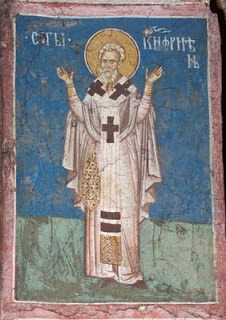
By the second half of the third century persecution had again erupted under the Emperor Valerian. Cyprian--the Bishop of Carthage was one of the first to suffer.
There are all sorts of martyrdoms. Some are savage, some polite. St Isaac Jogues, for instance, was slowly tortured by the Iroquois who cut off his fingers and ate them. Not nice.
Cyprian, however, was treated with courtesy and respect. The proconsuls pleaded with many of the Christians to offer sacrifice to the gods as the emperor demanded by placing just one tiny grain of incense on the fire. Surely there was nothing wrong in such a small compromise?
Many did compromise in this way. Cyprian and many others did not. A gentleman to the end, he gave the executioner a bag of money, knelt to be blindfolded and then be-headed.
It's a reminder that the seemingly little choices we have to make may be the most important. I'm reading Waugh's Sword of Honor trilogy at the moment and old Crouchback, in a line which is the theme of the book, says, "Quantitative judgements don't apply." When it comes to spiritual matters, the small grain of incense offered to the gods may be the price of your soul.
Likewise, every day we have the choice of mini martyrdoms. Will we make the choice for for prestige, self preservation, prosperity and power or will we make the choice of serving God and serving others? The principle behind the choice is what matters most.
Quantitative judgments don't apply.
Published on September 16, 2011 05:58
September 15, 2011
The Sorrowful Mother Helping Mothers
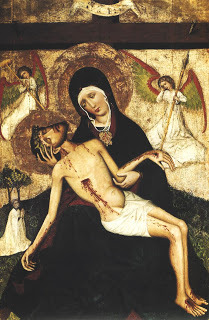 So often in counseling or the confessional I come across grieving mothers. Mothers who are so terrible concerned for their children who are straying--mothers upset about their childrens' loss of faith. Mothers worried about their children's choice of spouse, their grandchildren's religious education, their children's career choice. You name it.
So often in counseling or the confessional I come across grieving mothers. Mothers who are so terrible concerned for their children who are straying--mothers upset about their childrens' loss of faith. Mothers worried about their children's choice of spouse, their grandchildren's religious education, their children's career choice. You name it.The typical male response is, "Get over it." But I realize that the mother has a bond with the child that the father doesn't really understand. Mama finds it difficult--very difficult to let go.
There's a little line at the heart of Arthur Miller's play, The Death of a Salesman where Willy Loman's wife, Linda sits on the stage alone. Her sons have both turned out to be losers. One she hasn't heard of for years. The other one is a layabout and a phony. Then her husband commits suicide. In her grief she says, "Life is a casting off."
So it is. Life is about letting go, not grabbing. We must, in the end, let go of all things and go out of this world naked and alone--just as we came into it. Life is a preparation for this final letting go, and therefore we should start practicing how. Throw the lumber overboard! Life is a casting off.
This is where the devotion of the Seven Sorrows of Mary can help women. In the seven sorrows the Blessed Mother struggles to cast off. Of all women she has an even closer bond to her child than others. Because she has the perfect bond with her son, the tearing away of motherhood is even more poignant and painful. Identifying with her sorrows through this devotion can help women make sense of their own suffering with their families.
How does this work? Like this: First sorrow--the prophecy of Simeon that a sword would pierce her own heart also. Women who are suffering begin to realize that this special mother's suffering is a way to draw closer to Christ and through their suffering a sword will pierce their own heart, and that this is part of the mystery of being one with Christ.
Second sorrow is the flight into Egypt. We realize that life is a pilgrimage. It is a casting off. It means not putting our tent pegs in too deep. There's a part of the Christian life which is nomadic. In other words, build a wonderful home and family, but don't invest too much in it emotionally because even this good thing is not permanent. If you make your home and children and family your god, then you will be disappointed. Even our loved ones must be cast off to follow Christ. Our home and family and earthly loves are temporary. They are provisional. The flight into Egypt reminds us that we are all spiritually speaking--refugees.
Third sorrow is losing the Christ child in the temple. At the age of puberty the child is starting to leave you. Don't cling to him or her. Parenting for teenagers is a different task than parenting children. Once they start to become adults the parents' job is to enable and empower their transition to independence. When your teens seek independence and privilege grant them responsibility with it. Help them transition into the independence they need. It hurts because many mothers want to keep their kids in that earlier child like stage. It doesn't work. You've got to let them go, and help them fly the nest.
Fourth sorrow is meeting Christ on the way of the Cross. When kids suffer mothers suffer. When kids go wrong. Mothers suffer. Mary walks in the way of the cross with her son. Often when kids get into trouble the best thing for Mama to do is to simply be there--to go through the problem with them and suffer with them. When Mothers step in to make things better and solve all the problems very often they make them worse. Instead, we sometimes have to simply go with the problems and accept the suffering and bear the burden with the child and let them work it out--even when we see them messing up more.
Fifth sorrow is the death of her son. There are all sorts of 'death' besides physical death, and all Mary can do is watch and grieve and give it to God. So with irrevocable bad choices which our children make which we feel are a kind of death--maybe they marry the wrong person or they commit some terrible crime or leave the faith altogether--all we can do is observe. We can do nothing about. They have free will. They must choose. All we can do is offer it up and give it to God and hope somehow, some way in his wonderful and loving providence he will turn it around to the good and bring salvation and redemption out of the tragedy.
Sixth sorrow is the Blessed Mother taking down the body of her son from the cross. This is the pieta. Once again, all Mary can do is accept and grieve and give it to God. Here in the depth of sorrow she is one with her son. This is why the pieta--with the sorrowful mother cradling her dead son is so poignant and powerful. A sword has pierced her own heart also. Simeon's prophecy is fulfilled and she suffers a kind of death in his death. Likewise, when our children 'die' either literally or spiritually and socially, we die with them and can only accept it and make sense of it inasmuch as it takes us more intimately into the death of Christ our Redeemer.
Finally, Mary helps to lay her son to rest. This is the final 'casting off'. She has handed him back to God who gave him to her in the first place. So with our children. They belong to God. He gave them to us to be stewards of his children of light. They were given to us as our most precious gifts and at the heart of our devotion to him we will have to hand them back. But in this exchange God returns them to us in a greater and more cosmic union--the union and re-union we all have within the mystical body of his Son.
The practical way to connect with the seven sorrows of Mary is through the devotion of the Seven Sorrows (aka the Seven Dolors) You can learn how to practice this devotion here. It consists in saying a chaplet like a rosary with particular prayers. Using the rosary in this way to connect with the events of our ordinary lives and bring Christ's healing into our lives is also the subject of my book Praying the Rosary for Inner Healing.
What intrigues me is that the Catholic Church has a powerful healing ministry. Through the traditional devotions the Holy Spirit can work to touch the deepest areas of our lives and transform us into the whole and complete saints God wants us to be.
Published on September 15, 2011 06:18
Happy Priest
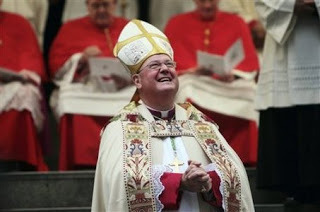
Deacon Greg reports here on a recent survey on the ten happiest jobs in the USA. Guess who comes out on top? Clergy. Number 4 is authors and writers.
Lucky me.
Published on September 15, 2011 05:17
Mother of Sorrows

Do you know the seven sorrows of Mary?
1. The Prophecy of Simeon
2. The Flight into Egypt
3. Losing the Child Jesus
4. Meeting her son on the Way of the Cross
5. The Death of her Son
6. The Deposition from the Cross
7. Laying Christ in the tomb
Learn about the devotion here. Resources to practice this devotion here.
Published on September 15, 2011 04:50
September 14, 2011
Towering Over
Perhaps I shouldn't joke about it, but when I was an Anglican curate there was a very tall, very holy Anglo Catholic priest in Eastbourne named Father Derek. Eastbourne, as the English readers will know, is a retirement area, and Father Derek was much loved by the old ladies in their cloth coats and dowdy hats with their coffee mornings and jumble sales.
We were processing out after Mass once and there was Father Derek all decked out in biretta and lacy cotta and cope- nearly seven feet tall-- a gentle giant of a man, and I'm standing at the back watching him process out smiling to all his old dears who loved his so, and his curate leans over to me and says, "There's Derek, towering o'er the wrecks of time."
We were processing out after Mass once and there was Father Derek all decked out in biretta and lacy cotta and cope- nearly seven feet tall-- a gentle giant of a man, and I'm standing at the back watching him process out smiling to all his old dears who loved his so, and his curate leans over to me and says, "There's Derek, towering o'er the wrecks of time."
Published on September 14, 2011 19:38
The Triumph of the Cross
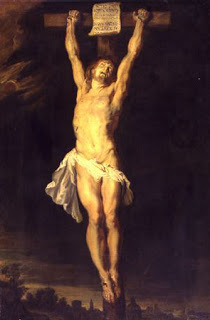
In the cross of Christ I glory,
Towering o'er the wrecks of time,
All the light of sacred story
Gathers round its head sublime.
When thy woes of life o'er-take me,
Hopes deceive and fears annoy,
Never shall the cross forsake me;
Lo! it glows with peace and joy.
When the sun of bliss is beaming
Light and love upon my way,
From the cross the radiance streaming
Adds new luster to the day.
Bane and blessing, pain and pleasure,
By the cross are sanctified;
Peace is there that knows no measure,
Joys that through all time abide.
Published on September 14, 2011 19:34
Mrs Brady Catholic Old Lady
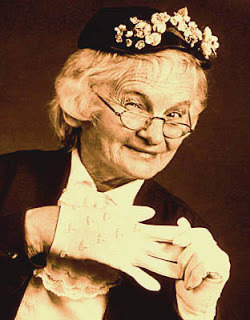
Freddy, why don't we take a break and sit on the porch for a few minutes? It was very sweet of you to leave all your college friends on a Saturday morning and help an old woman with yard work, but you're all sweaty and my poor old back is killing me.
I think we can leave those azaleas until next week don't you? You will come and help again next Saturday won't you? Good. Well, I must say I enjoy your visits too. It doesn't matter if we don't get too much work done, and besides I think it's lunchtime. I just baked that bread this morning, and there's some ham left over from Sunday. I bet you'd like a big ham sandwich. Do you want a pickle? Why don't you sit on the porch and relax with Samson while fix us some lunch. Do you like onion soup? Oh good!
Here we are. Now I was interested in what you said last week about that church you go do sometimes with your friends. You know I went to one of those churches once with Mrs Hudson who lives across the street, and they invited me to "accept Jesus into my heart." Bless them, they didn't know I was brought up Baptist and knew all about that sort of thing already. So I said that I had already accepted Jesus not only into my heart, but into my stomach too. Because you see, I'd been to Mass that morning. Oh dear, they didn't really know what to think, and I'm afraid I might have offended them because they gave me a rather disagreeable look.
Freddy dear, I'm sure those folks are very sincere, and they are probably better Christians than I am, but I've always been rather leery about all those emotional religious experiences. I'm not one for holy huddles where everyone sits around and studies the Bible. Oh, don't get me wrong Freddy. I think the Bible is quite wonderful and read a chapter every night before bed. I know I'm being petty and mean, but I just found it tiresome to spend a whole evening with a group of other ladies only to discover what a particular Bible passage meant to Mildred Dawkins.
Now Mildred's a very fine Christian woman, but she's not exactly a Bible scholar. Dear me, I'm getting off the point. Let's see, where was I. Oh, yes, I've never been very fond of these groups who try to get me to have some sort of exciting or comforting or pleasant religious experience. It seems too manufactured if you see what I mean. It's like this Freddy dear, I've thought it through quite a lot you see, and it seems to me that if a religious experience is pleasant, then it is more likely that I have made it all up in my own mind--it's sort of like wishful thinking. Do you know I once went to one of their charismatic prayer meetings and Mildred Dawkins went up to receive prayers from the preacher. My goodness! There were people falling over in a dead faint when he prayed over them and they were all crying out and laughing and saying they were filled with the Holy Spirit and then I noticed that when Mildred went forward she double checked to see if her catcher was there. The 'catcher' is the fellow they have there to catch them when they swoon. I sort of caught her at it. Goodness! looking back it was all rather funny. You see, Mildred had planned to swoon, and sure enough, when she toppled over and lay there on the floor she even arranged her skirt so nobody could look up it.
So I said to Mildred the next day, "My dear, you looked like you were planning to swoon last night for the preacher." Of course she denied and has been rather huffy to me ever since.
The point is dear Freddy, that if a religious experience is pleasant in some way it is more likely to have been something I've sought out, and that's not quite right is it? It doesn't, feel right somehow. For my part, I've always felt closest to the good Lord when things are going wrong--not when they're going right. I remember when Mr Brady died and my world rather fell apart. Then in the middle of it all I had the most wonderful sense of Jesus Christ being at my side. Oh, nothing warm and fuzzy or pleasing. I didn't swoon like Mildred Dawkins or anything like that. I just knew Christ at a deeper level than before.
So if you don't like that sort of church they take you to, why I wouldn't go. Just come over here instead and tell them you're going to do yard work and we can have a nice chat and perhaps bake some cookies and take them over to Mr. Klondyke who everybody thinks is so grumpy, but who I have a rather soft spot for.
Goodness, is that the time? Let's get the car out and I'll get you back to campus before you get yourself into trouble again.
Published on September 14, 2011 09:07
Dwight Longenecker's Blog
- Dwight Longenecker's profile
- 80 followers
Dwight Longenecker isn't a Goodreads Author
(yet),
but they
do have a blog,
so here are some recent posts imported from
their feed.



